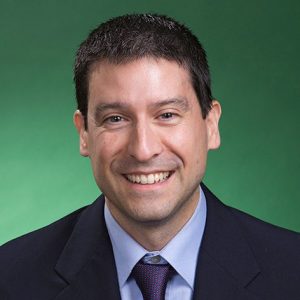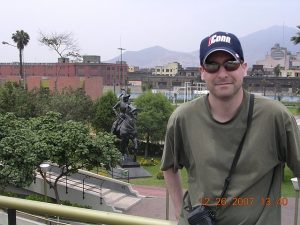I had a tremendous experience at UConn. To begin, Frank was – and remains – a wonderful advisor and mentor… Equally important, I came in with a fantastic cohort of graduate students, many of whom I’m still close with to this day. There was a real community that sustained me both personally and professionally.
 1) How did you decide to pursue a PhD at UConn? What was your academic focus coming into the program, and how did that evolve over the course of your studies?
1) How did you decide to pursue a PhD at UConn? What was your academic focus coming into the program, and how did that evolve over the course of your studies?
I had been a newspaper reporter for a few years before transitioning to public relations in New York City. My dissatisfaction with PR led me to reflect on what I liked to do, which was researching and writing. At the same time, I had always remained interested in the United States’ place in the world. I slowly came to the realization that graduate school would be the pathway to get me where I wanted to go – which was to write about the history of U.S. foreign relations. In the course of researching programs and advisors, I met with Frank Costigliola. He saw potential in me and supported my candidacy at UConn. Over time, my interest in the United States’ place in the world led me to focus more intently on U.S.-Latin American relations at the turn of the 20th century. Drilling down further, I began looking more closely at U.S.-Cuban relations, which became the subject of my dissertation and later my first book, America’s Forgotten Colony: Cuba’s Isle of Pines.
2) What was your experience as a graduate student in the History Department? What is your most memorable experience from the History classroom?
I had a tremendous experience at UConn. To begin, Frank was – and remains – a wonderful advisor and mentor. In retrospect, it’s stunning to think about how much I did NOT know about anything related to graduate school and the study of History. But Frank’s patience and encouragement helped guide me along. Equally important, I came in with a fantastic cohort of graduate students, many of whom I’m still close with to this day. There was a real community that sustained me both personally and professionally. In the classroom, my time as a TA subtly shifted my career focus. I quickly came to appreciate the value of student interaction and wanted to put undergraduate teaching front-and-center of whatever job I got after graduation; it’s precisely what I found when I started at Nichols College in 2014. The UConn History Department gave me plenty of opportunity and space in which to develop as a teacher, which was a very beneficial experience.
3) What skills did you gain from the doctoral program, and how did the program help prepare you for your career?

Almost everything I am professionally, I owe to my time at UConn. I learned how to write more effectively, thanks particularly to the sharp editing of Frank as well as Garry Clifford, who passed away in 2014. I became a better researcher through the numerous papers I wrote in seminars as well as the financial support to go to different archives. And nerve-racking though it was, preparing for my oral exam gave me the opportunity to understand more deeply the historiography of my field. As a teacher, my experience leading discussion sections and later having my own classes gave me room to figure out different aspects of effective teaching – from readings and assignments, to lectures and student interaction.
4) What is one piece of advice that you would give to current graduate students?
I’m going to split this out into two…
First: make sure you have a passion for History, whether it’s learning about it, writing about it, or teaching it. It can be a long, frustrating road to get a graduate degree, but so long as the desire is there – aided by a supportive community – it will help propel you through the tough times.
Second: very early on, think about what you want to do AFTER graduate school. Although this is starting to change in recent years, many graduate programs essentially are training future academics. The realities of the academic job market, however, make that a difficult gambit. Nevertheless, if that’s what you want to do – go for it. At the same time, if a tenure-track job is your primary career ambition, be sure to consider alternatives along the way. I had been out for two years before I landed my current position and I was probably a year away from seeking a different path. In my time in the “wilderness” (as I called it), the department continued to support me with adjunct classes and encouragement. It helped sustain me and enabled me to get where I am today.